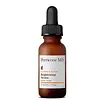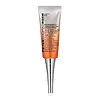What's inside
What's inside
 Key Ingredients
Key Ingredients

 Benefits
Benefits

 Concerns
Concerns

 Ingredients Side-by-side
Ingredients Side-by-side

Water
Skin ConditioningTetrahexyldecyl Ascorbate
AntioxidantCaprylyl Methicone
Skin ConditioningHydrogenated Lecithin
EmulsifyingBehenyl Alcohol
EmollientBenzyl Alcohol
PerfumingSqualane
EmollientRosmarinus Officinalis Leaf Extract
AntimicrobialFerulic Acid
AntimicrobialSimmondsia Chinensis Seed Oil
EmollientSodium Hyaluronate
HumectantPolysorbate 20
EmulsifyingXanthan Gum
EmulsifyingBeta-Glucan
Skin ConditioningParfum
MaskingSorbitol
HumectantLimonene
PerfumingStearyl Glycyrrhetinate
Skin ConditioningDisodium EDTA
Elaeis Guineensis Oil
EmollientTocotrienols
Skin ConditioningLinalool
PerfumingTocopherol
AntioxidantCitral
PerfumingCitronellol
PerfumingWater, Tetrahexyldecyl Ascorbate, Caprylyl Methicone, Hydrogenated Lecithin, Behenyl Alcohol, Benzyl Alcohol, Squalane, Rosmarinus Officinalis Leaf Extract, Ferulic Acid, Simmondsia Chinensis Seed Oil, Sodium Hyaluronate, Polysorbate 20, Xanthan Gum, Beta-Glucan, Parfum, Sorbitol, Limonene, Stearyl Glycyrrhetinate, Disodium EDTA, Elaeis Guineensis Oil, Tocotrienols, Linalool, Tocopherol, Citral, Citronellol
Water
Skin ConditioningTetrahexyldecyl Ascorbate
AntioxidantPEG-8 Beeswax
EmulsifyingButylene Glycol
HumectantMagnesium Aluminum Silicate
AbsorbentCetearyl Alcohol
EmollientTocopheryl Acetate
AntioxidantGlyceryl Stearate
EmollientPEG-100 Stearate
Ferulic Acid
AntimicrobialIsopropyl Palmitate
EmollientGlycerin
HumectantCeteareth-20
CleansingDimethicone
EmollientAllantoin
Skin ConditioningAloe Barbadensis Leaf Juice
Skin ConditioningAngelica Acutiloba Root Extract
Skin ConditioningDictyopteris Polypodioides Extract
EmollientCitric Acid
BufferingDisodium EDTA
Titanium Dioxide
Cosmetic ColorantMica
Cosmetic ColorantPotassium Bitartrate
BufferingPotassium Sorbate
PreservativeSodium Benzoate
MaskingPhenoxyethanol
PreservativeWater, Tetrahexyldecyl Ascorbate, PEG-8 Beeswax, Butylene Glycol, Magnesium Aluminum Silicate, Cetearyl Alcohol, Tocopheryl Acetate, Glyceryl Stearate, PEG-100 Stearate, Ferulic Acid, Isopropyl Palmitate, Glycerin, Ceteareth-20, Dimethicone, Allantoin, Aloe Barbadensis Leaf Juice, Angelica Acutiloba Root Extract, Dictyopteris Polypodioides Extract, Citric Acid, Disodium EDTA, Titanium Dioxide, Mica, Potassium Bitartrate, Potassium Sorbate, Sodium Benzoate, Phenoxyethanol
Ingredients Explained
These ingredients are found in both products.
Ingredients higher up in an ingredient list are typically present in a larger amount.
Disodium EDTA plays a role in making products more stable by aiding other preservatives.
It is a chelating agent, meaning it neutralizes metal ions that may be found in a product.
Disodium EDTA is a salt of edetic acid and is found to be safe in cosmetic ingredients.
Learn more about Disodium EDTAFerulic Acid is a plant based antioxidant. By fighting free-radicals, ferulic acid can help reduce the formation of fine lines and hyperpigmentation.
When used with Vitamin C, Ferulic Acid has shown to prevent Vitamin C from breaking down. In other words, it acts as a stabilizer.
Ferulic Acid is sometimes used to preserve food. Foods containing Ferulic Acid include: oats, rice, eggplant, citrus.
In medicine, Ferulic Acid is being studied for helping with diabetes, Alzheimer's, and cardiovascular diseases.
Learn more about Ferulic AcidTetrahexyldecyl Ascorbate (THD) is a stable and oil-soluble form of Vitamin C.
THD is special in that it has the ability to travel deeper into skin than traditional ascorbic acid while maintaining the same skin benefits (double win!).
Because it’s oil-soluble, THD dives deep into your skin’s fatty layers (think ceramides and cholesterol) to fight off the kind of free radicals that mess with your skin barrier. This makes it a great pair with water-based vitamin C (ascorbic acid) that mainly works on the surface.
Even at just 0.1%, THD is already showing great antioxidant activity. When used up to 2%, it helps keep your skin happy and calm, especially when it’s stressed from pollution or sun.
Want to fade dark spots or tackle hyperpigmentation? You’ll want 5% or more. Pairing it with brightening buddies like niacinamide or licorice root gives even better results. One study even used 30% THD with other brighteners and saw real results on stubborn discoloration, even in melasma-prone skin.
A note on THD: It’s has a slightly silky, oily texture and usually shows up colorless or pale yellow (though the exact shade can vary by supplier).
While you can sneak it into water-based formulas, it really shines when paired with silicones or oils, which help your skin soak it up better.
THD is pretty stable, but it’s still vulnerable to degradation like ascorbic acid. Too much light or heat (above 113°F / 45°C) can break it down over time. Go for dark and opaque packaging that keeps it safe and shady!
Read more about other types of Vitamin C:
Learn more about Tetrahexyldecyl AscorbateWater. It's the most common cosmetic ingredient of all. You'll usually see it at the top of ingredient lists, meaning that it makes up the largest part of the product.
So why is it so popular? Water most often acts as a solvent - this means that it helps dissolve other ingredients into the formulation.
You'll also recognize water as that liquid we all need to stay alive. If you see this, drink a glass of water. Stay hydrated!
Learn more about Water